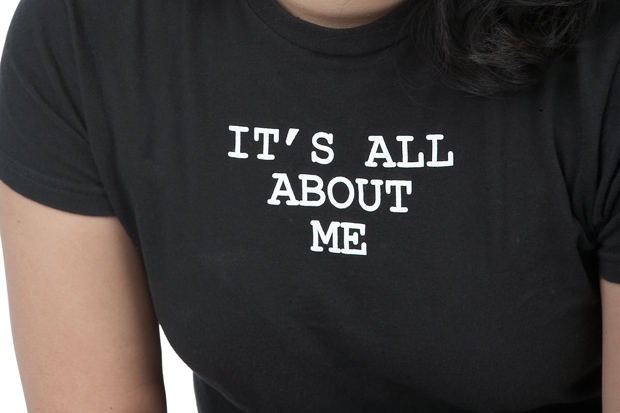As a provincial teenage virgin with ideas so far above my station that they gave me vertigo, I frequently reflected bitterly that whoever coined the phrase ‘Schooldays are the best days of your life’ must have come to that conclusion after being involved in a serious car-crash the evening following their last day at school, probably rendering them a tetraplegic. And the little thing which summed up how thoroughly inappropriate it was was the horridness of name tags. All the wondrous beings I had it in me to be, written off by my mum’s humdrum hand in those four syllables: Julie Burchill.
Then and there, I took a violent dislike to clothing with writing on. In the 1980s I was repelled by the rise of designer clothing. Excuse me, but who ever dreamt of growing up to be a sandwich-board man, with all respect? It got even worse when the author’s message took over; top of my loathe list was the trendy tat-touter Katharine Hamnett, whose infamous T-shirts — CHOOSE LIFE, 58% DON’T WANT PERSHING— made my eyes cross in fury.
Imagine my glee when my second husband’s bezzie starting sleeping with her and we were asked over for ‘supper’; we’d barely sat down before she was dropping bons mots. ‘The young poor dress so much better than the young rich,’ she drawled. ‘That’s because the young poor can’t afford your clothes!’ I came right back. She had her boy toy show us the door, but I’ve often recalled that evening when I pass yet another halfwit walking down the street bearing the legend NO WAR, SAVE THE FUTURE or, best of all, NO MORE FASHION VICTIMS in big black letters on a baggy white T.
Most of all, I think of the immortal words of Fran Lebowitz: ‘If people don’t want to listen to you, what makes you think they want to hear from your sweater?’ When I see someone wearing clothing with words on my first reaction is usually, ‘Ooo, I bet you’re really boring!’
It’s not just clothes with legends or logos on, either; it is my experience generally that the more trouble people take with their appearance, the duller the company they are. I make an exception for young things in their teens and twenties, of course, who are still in that adorable ‘the wonder of me’ phase, and who quite understandably want to gild the lily before it fades. But I am firmly of the opinion that women who fuss over their appearance in middle age (unless they are entertainers or prostitutes) are rather sad, as one should surely have something more substantial to recommend one by this time — such as kindness, spite or cleverness.
Fully functioning human beings express themselves through their words and their actions; only the voiceless are reduced to expressing themselves through the way they look. The dictionary’s first definition of the word ‘statement’ is the best: a definite or clear expression of something in speech or writing. Yet we are now offered the chance to buy statement necklaces and statement earrings and be told by Fearne Cotton — a 33-year-old woman — that ‘I like a red lip against a white dress as it makes a statement.’ Yes — it tells us that you wore red lipstick and a white dress. The words ‘female eunuch’ come to mind when confronted with such cretinism, but never more than when faced with the trend of writers and books — the opposite of looks — being co-opted into such shallow show-offery. Bella Freud’s GINSBERG IS GOD T-shirt may as well have I AM A SUB-LITERATE HALFWIT printed on the back. And as for carrying a clutch bag made in the image of a book — words fail me.
It’s not just the clothes on your back and the bag in your hand which beg for attention in lieu of personality these days, though. The new director of Tiffany, Francesca Amfitheatrof, says quite shamelessly: ‘Jewellery is a way of expressing your personality, sometimes telegraphing your social status and, ultimately, making your mark in a tangible, beautiful way.’ You can eat your words, too, by having your name printed on a jar of Nutella for less than a fiver, or waste £50 on a personalised silver Marmite jar lid. The Times reported recently that retailers reported a steep rise in the demand for ‘personalisation’, which has become ‘a right rather than a privilege’, according to retail analysts.
In a more confident era, Andy Warhol wrote:
What’s great about this country is that America started the tradition where the richest consumers buy essentially the same things as the poorest. You can be watching TV and see Coca-Cola, and you know that the President drinks Coke, Liz Taylor drinks Coke, and just think, you can drink Coke, too. A Coke is a Coke and no amount of money can get you a better Coke than the one the bum on the corner is drinking. All the Cokes are the same and all the Cokes are good. Liz Taylor knows it, the President knows it, the bum knows it, and you know it.
Perhaps now that it is closing time in the gardens of the West and we contemplate a Chinese-led future, our fear of anonymity leads us to insist, over and over through the medium of monograms, that we are not numbers but free men — and here’s our personalised Coke to prove it. A third of us, according to a recent survey, feel that we are denied free speech on important issues such as immigration, religion, moral and ethical issues; never mind, sling a monogrammed Cambridge satchel over your shoulder and you’re good to go, right down that road to nowhere.
The problem is that visual signalling is an utterly useless way of establishing identity — not waving but drowning — because only ‘a definite or clear expression of something in speech or writing’ can do this. And it is crack cocaine to the insecure; I know without doubt that I am interesting and un-usual — why would I ever visit a beauty site called Feel Unique, or buy a perfume called Original (‘to inspire you to rediscover your uniqueness’) or knit a personalised Whistles beanie hat (£45 for the kit)?
Imagination, wit, originality; these are the qualities that can build a better life, both for individuals and for cultures. Rely on your possessions to express yourself, however, and you might as well walk alongside someone wearing a T-shirt bearing that immortal legend I’M WITH STUPID. Now there’s a logo I thoroughly approve of.







Comments